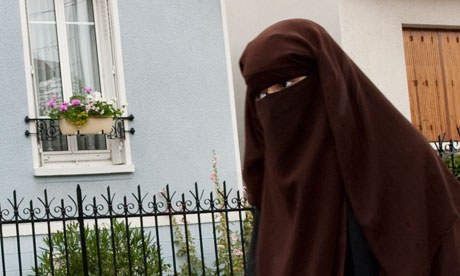A judge in Meaux has fined two French women for wearing the niqab – the first sanction since France banned Islamic full-face veils in April.
 |
| Hind Ahmas is one of two women to be fined by a French court for wearing niqab in public in the first legal punishment to be handed out since the ban. Photograph: Magali Delporte for the Guardian |
Hind Ahmas, a 32-year-old single mother from a Paris suburb, and another 36-year-old woman who did not want to be named, were handed fines of €120 and €80 (£105 and £70) respectively. The judge is expected to hand out a full ruling on Thursday explaining his decision.
The fines mark the first time a French court has pronounced on the niqab ban, the controversial law backed by Nicolas Sarkozy that bans women wearing full-face veils from all public places, including walking down the street, taking a bus, going to court or collecting children from school. More than 90 women have been stopped by police but until now, no one had been punished by a court for wearing a face-veil.
The two women were stopped in the street on 5 May near the town hall in Meaux, east of Paris, where the mayor is Jean-François Copé – an architect of the ban and head of Sarkozy's ruling rightwing UMP party.
The date was Copé's birthday and the women had arrived at the town hall wearing full-face coverings and carrying a birthday cake for him made of almonds. Their action was intended as a play on the word "almond" in French – amande, which is close to the word "fine" – amende. The women said they wanted to expose the absurdity of a law that discriminated against Muslims and made a mockery of the justice system.
They were supported by the group Don't Touch my Constitution, which has led protests at the ban.
Gilles Devers, a lawyer for the women, said the pair would immediately appeal to France's supreme court and to the European court of human rights if necessary. Devers argued the French niqab ban contravened European human rights legislation on personal liberties and freedom of religion.
Ahmas was not allowed into court during the initial court hearing in June because she was wearing a niqab and refused to remove it at the request of a police officer, offering instead to lift it for an identity check.
Source: The Guardian








0 comments:
Post a Comment